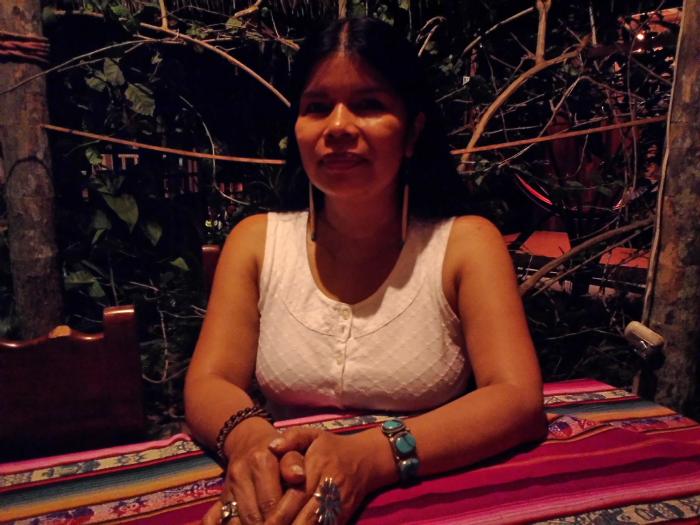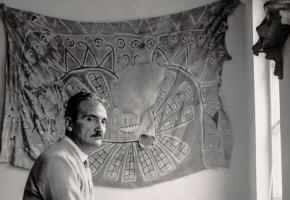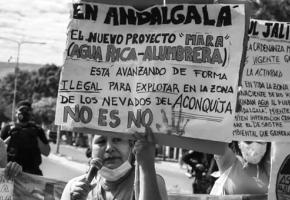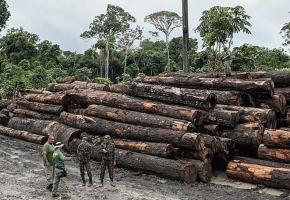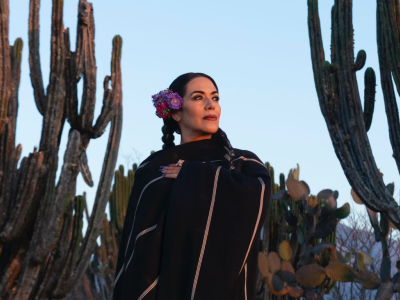Linda Etchart: Tell us about the emergence of the Amazonian Women’s Movement
Patricia Gualinga: The great mobilisations of 1990-1992 [of the indigenous peoples of Ecuador] were led by men, and initially we were always behind the great leaders, supporting them, in some ways sustaining the system but we were not in the forefront. But then it all began to change as the in-fighting started and the movements began to fall apart and there was a moment when the women came together and said: ‘We cannot let this happen. We are not going to defend the men.’
We have a common objective, which is to defend our territory. This uncontaminated land must be inherited by future generations. And if our men have been demoralised, have lost heart, then the women will rise to the challenge, as wives, mothers, daughters, sisters, and will go to the front line.
We set off on the march to Quito from Puyo on 12 October 2013 at a time when marches were banned, to say to the government that we women did not give our consent to oil and mineral extraction on our territory. I think that this was a defining moment, the first time that a woman’s point of view was heard. The men’s voices had ceased to have credibility, had lost the power to defend our territory. Now it was the turn of the women, ordinary women, with simple words, that were not affected by political discourse.
We women declared ourselves against oil extraction and mining, and called for our rights to be respected. This was the beginning of the Amazonian women’s movement. Great women leaders have emerged, such as Alicia Cawiya [of the Huaorani people], who can speak to the National Assembly, and Gloria Ushigua [of the Sápara people]. Throwing ourselves into defending our territory has made us women visible, and has given us status. We were there all along, but behind the scenes, doing the preparatory work, getting everything ready. Now we are stepping forward, and we can be seen in the front line, some of us. It is a mission that has been a long time in the making, with women backing the struggle for our territory and for the rights of the indigenous peoples.”
Linda Etchart: How does this link to the struggle against alcoholism in your community?
Patricia Gualinga: “If we are talking about challenges facing women, I would begin by saying that the challenge is ourselves. If all women wanted to change the ways things are, then it would be much easier. But we find ourselves within a social and cultural structure that has been reproduced over many years. Many women do not recognise that they can have control over their lives. There is a problem, for example, in the way some women view the introduction of alcohol into Sarayaku that comes from Puyo [the nearest town to Sarayaku].
We make our own alcohol ‘chicha’, which is consumed in large quantities, but its impact is less than that of rum, which has caught our communities in the alcohol trap. Some of us women do not drink alcohol, and we have taken a stand against it.
As a leader I managed to put a ban on alcohol in the Sarayaku community, but we have encountered resistance from a contingent of men who do not agree it. There are leaders among the resisters, good, able, intellectual, powerful men, who when we come to discussing the theme of alcohol do not confront the problem or do not try to set an example, which I think is a big problem. As you will have seen, as you arrived over a weekend, on a Sunday, Marquitos [the Sarayakan artist and craftman] had just died [of cirrhosis of the liver]. Candles were lit and it would appear that the mourners drowned their grief, their sorrow, in alcohol. This is a way of avoiding the problem.
I have seen indigenous leaders, not just from Sarayaku, who have endured such pressure and subjected to attempts to discredit them while defending our territory against the government or the oil companies, that Sooner or later they break down and seek solace in beer or spirits.
Marquitos died of cirrhosis. But also because Hepatitis B has struck the indigenous peoples—the Huaorani, the Kichwa, and the Sápara. And when someone has Hepatitis B without and drinks alcohol, it destroys the liver, which is why there have been cases of cirrhosis. It is not just because they drink alcohol but they have died because their defences are lower. So the combination of Hepatitis B and alcohol has caused the deaths of young people like Marquitos.
The Sarayaku people are suffering, but there are many people dying in the Huaorani territory. Illnesses as well as the extractive industries have afflicted the indigenous peoples, and we do not know how to deal with them.
So for me, as a woman, the greatest challenge is ourselves. I know what the men are like. I know their weaknesses, their way of attempting to dominate. But the women’s reluctance to change is also a structural problem. I have worked with men and women leaders. But for me as a woman, my greatest challenge is to convince other women to address these deeper issues.”
Linda Etchart: How have Amazonian women joined the worldwide indigenous women’s movement
Patricia Gualinga: “Indigenous women appeared on the scene at the same time all over the continent, with the same idea, the same vision, of defending, protecting the rights of future generations. We’ve been doing the same things, without even knowing each other, and gradually we have been meeting each other in different parts of the world.
From the Inuit in Canada and those fighting Tar Sands to those in North Dakota resisting the oil pipelines and the Mapuche in Chile, women are engaged in the struggle in different places. We signed the first agreement one year ago in New York in September 2015. Then in December we met again in Paris at the climate talks. Some of those women joined us for the Women’s March [on 8 March 2016] here in Ecuador on International Women’s Day. We have just sent a message to the women of Missouri, some of whom are in Washington DC, others who are opposing the oil pipeline there. We keep in contact according to what is happening in each place.
It was spontaneous, unplanned and we have a long way to go in forming an organisational structure. We just appeared, like plants, and are now organising ourselves. All of us are leaders who are well known in certain places. We do not speak the same language, but we manage to understand each other somehow. With some translation, sign language and with our hearts and feelings, we are able to relate to each other, which is very positive. We all feel and act positive in our quest to defend nature, mother earth, planet earth. If the earth is our mother, a female, then her defence is in our hands.
This interview will be one of many 'voices' to be published in a book Latin American Voices in 2018, being put together by the Latin American Bureau


